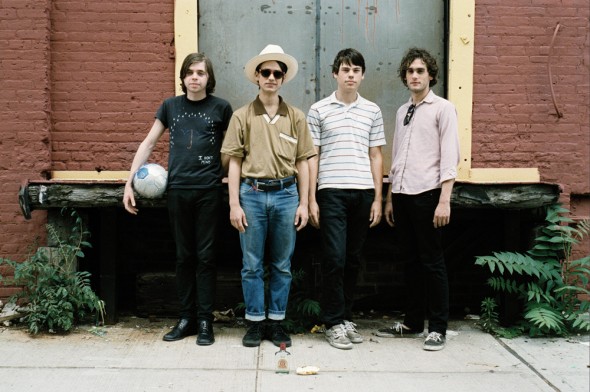
Photography by Lenard Smith
The Strange Boys occupy, appropriately enough, a weird space in music. A quick listen and one might label them as just another ramshackle member of the garage rock revival from the early 2000’s. And with such a forgettable name, you might assume they were that band from O Brother Where Art Thou? Even their album cover—a dim, underexposed photo of four smiling faces in the dark—nearly begs you to flip right past them while browsing for new records.
Ryan Sambol, The Strange Boys’ principal songwriter, is understandably hesitant to label the band, but eventually settles on a classification: rock ‘n’ roll. But “rock” is a broad genre, and they’ve got a lot of company on the racks between Sting and The Stranglers. In order to get to the bottom of The Strange Boys and their latest record, …And Girls Club, one should take a moment to understand their own definition of “straightforward rock” as well as how this definition plays a role in how they make their music.
There is reluctance in Sambol’s voice over the phone, as he admits 20 minutes into the conversation, “I’m not a very good interviewee.” But just because he seems to believe this, does not mean that he has nothing to say. On the contrary, it becomes apparent that the front man is quite vested in the written word. Within a matter of seconds, he adds, “I’m a writer too. All the lyrics were poems before, or short stories, or anything: an idea, a daydream. If you think of records being put out as ‘published,’ then I guess I’m published.”
When asked why Sambol prefers music over contemporary poetry to convey his voice, he says, “With music and playing straightforward rock, you can sing whatever you’d like. So, if I just sing those songs, it’s instant gratification, I can show people right away. Whereas I don’t know many kids that read modern books of poetry. It’s speaking with the megaphone you have. I would love to publish a collection of short stories or a novel or poems, but I just want to do what I have now.”
With this in mind, the image of The Strange Boys begins to solidify—the nearly-blank CD case, recognizable style of the music, and nearly inaudible lyrics—they are beginning to serve as a platform to showcase the words themselves. “Music is a way to get that poetry to someone. You can’t understand a lot of what I say when I say it, but when we did this record we had enough space to put all the lyrics in. If you’re just digging the song and you’re just hummin’ along and you don’t care what I’m saying, then you dig the song and you don’t care what I’m saying,” Sambol says. “But if you like what I’m saying, and you don’t like the song, then you should be able to read that and be exposed to that.”
Assumptions can be tricky. However, in a time when an overwhelming torrent of music leaves listeners without a moment to consider more than their most basic and immediate response to a song, The Strange Boys should be recognized for their conscious decision to eliminate distractions from what’s most important: the words themselves.
After all, to slap a label on a sound is to admit you have only given it a modicum of thought. Unlike many of their peers, The Strange Boys recognize that these assumptions are inevitable. But like the ambiguous smiling faces on the cover of the record, they are either mocking your lazy guesses, or they are inviting you to take the time to get to know them a little better.
– Andrew Dalton

